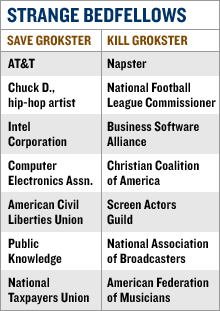 |
| A Supreme Court case is drawing a lot of interest from many places. Here's a look at the how the camps are split. |
|
|
|
NEW YORK (CNN/Money) -
The online store that supplies 99-cent songs for your iPod just celebrated its 300 millionth sale. But a new study suggests that free music downloading is alive and well in the virtual world.
The Pew Internet & American Life Project, in a report released Wednesday, found that 7 million Americans -- or about 9 percent of Internet users -- are currently making unlicensed copies of music from someone else's iPod or similar MP3 device. About 10 million are getting bootlegged music and movies through e-mail and instant messages.
To some analysts, the study offers further proof of the myriad ways that piracy is thriving despite efforts by the entertainment industry to curb it.
"Apple Computer has spent a couple of years working its way to 300 million songs sold (for its iPod)," said Eric Garland, the CEO of file-sharing tracker BigChampagne. "We think, very conservatively, that 750 million unauthorized or free songs are swapped online every month."
Next week, entertainment companies will ask the U.S. Supreme Court for help in a case that is remarkable on many fronts, including the extraordinary interest it has drawn not just from the technology sector but also from myriad groups like the Christian Coalition of America, the American Civil Liberties Union, the National Taxpayers Union and the commissioner of major league baseball.
The case, MGM v. Grokster, is about an increasingly popular method for Internet downloading known as "peer-to-peer" file sharing. The technology first gained national attention four years ago when a startup called Napster fueled massive music piracy before record labels won a court order shutting down the service.
Last summer, the appeals court that shut down Napster refused to do the same with the developers and distributors of the Grokster and Morpheus software, which allow users to trade music and movie files without going to a central site like Napster. The court found that there were critical differences between Napster and its Grokster & Co. successors.
The ghost of 'Betamax'
The key question in Grokster is whether peer-to-peer software providers should be held liable for illegal uses of their technology.
Both sides of the battle portray the outcome in apocryphal terms. It appears that no less than the future of the Internet -- and possibly the U.S. economy -- is at stake.
"This case is not about bad actors," said Michael Weiss, the CEO of Morpheus developer StreamCast Networks, at a press conference early this month. "It's about technology and who gets to control it, plain and simple."
Weiss and other peer-to-peer defenders say a ruling against them could apply to Apple or any other technology company that manufactures any device used to steal copyrighted works online.
Hollywood and the music labels call the scale of online piracy "mindboggling." They argue that billions of dollars worth of lost sales and licensing fees are at stake.
Critics say those claims are overblown and point to signs that the industry is in good health. Overall the music business sold 817 million units -- including albums, singles and digital downloads -- in 2004, a 19 percent jump from the prior year, according to research firm Nielsen SoundScan.
Much of the increase was attributed to digital music sales, through Apple's iTunes and other paid online services, as well as resurgent CD sales.
Movie piracy is still considered nascent because it takes far more technological might to download a flick than it does to download a song. But that's changing with the emergence of newer, better peer-to-peer programs such as BitTorrent and eDonkey.
Odd alliances
The debate has created some strange bedfellows. For instance, religious and "pro-family" groups have set aside their gripes over on-air nudity and profanity to support the entertainment industry because they think peer-to-peer is widely used by pornographers and other miscreants.
The Grokster debate hinges on dueling interpretations of a 21-year-old landmark Supreme Court decision that allowed Sony Corporation's Betamax to stay on the market. In Sony v. Universal City Studios, the high court found that home video recorders had primarily legitimate purposes that far outweighed their illegal uses.
So Grokster is likely to be decided on whether peer-to-peer technology has enough legitimate uses to satisfy the court.
According to BigChampagne's Garland, the vast majority of the 6.2 million Americans who were using peer-to-peer at any given time in February were using the technology for illicit purposes.
But that doesn't mean that will always be the case, argues StreamCast lawyer Fed von Lohmann. "You don't want to condemn a technology in its infancy before non-infringing uses have had a chance to take hold," said von Lohmann, who is a senior staff attorney with the Electronic Frontier Foundation, a digital rights advocacy group.
Grokster is one battle in a long war
The Supreme Court will hear oral arguments in Grokster March 29, with a decision expected by early summer.
No matter who wins the case, both sides acknowledge that the battle over piracy will continue -- in Congress and in the courts.
Hollywood and the recording industry have already sued thousands of individuals for allegedly illegal downloads using Grokster, BitTorrent, eDonkey and others.
Garland predicts the litigation blitzkrieg against individuals will continue no matter what happens in Grokster. The Betamax case was about an actual device that, had the high court ruled the other way, would no longer have been manufactured. Grokster is about lines of indestructible computer code. "All you can do (in Grokster) is remove a company from the equation," explained Garland.
"At a certain point it will always comes back to the end users and the lawsuits again individual users," he said.
Click here for more on technology.
Click here for more on the Fortune 500.

|